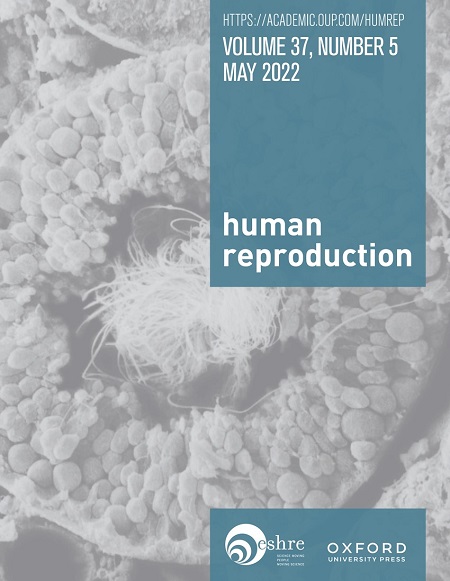Preconception sleep, pregnancy loss, and adverse pregnancy outcomes among women with a history of pregnancy loss
IF 6
1区 医学
Q1 OBSTETRICS & GYNECOLOGY
引用次数: 0
Abstract
STUDY QUESTION Are preconception sleep characteristics associated with pregnancy loss and adverse pregnancy outcomes? SUMMARY ANSWER Preconception sleep characteristics were not associated with pregnancy loss, but earlier sleep midpoints were associated with lower risk of adverse pregnancy outcomes, while social jetlag >1 h was associated with greater risk of a composite of adverse pregnancy outcomes. WHAT IS KNOWN ALREADY Short sleep duration in mid-pregnancy has been associated with risk of second-trimester pregnancy loss, preterm birth (PTB), and hypertensive disorders of pregnancy (HDP). The relationships between preconception sleep and pregnancy loss, and adverse pregnancy outcomes have not been well characterized, despite plausible links. STUDY DESIGN, SIZE, DURATION This was a secondary analysis of a randomized controlled trial conducted between 2006 and 2012 that prospectively followed 1228 women who were attempting to become pregnant after a history of pregnancy loss. Women were followed for ≤6 cycles while attempting pregnancy, and throughout pregnancy if they conceived. Over the follow-up, 140 women withdrew from the study. PARTICIPANTS/MATERIALS, SETTING, METHODS This study evaluated baseline, self-reported preconception sleep duration, sleep latency, sleep midpoint, and social jetlag with risk of pregnancy loss and adverse pregnancy outcomes (e.g. PTB, HDP, and gestational diabetes (GDM)) among 1228 women with a history of pregnancy loss in the EAGeR trial. Pregnancy was documented by hCG tests; 797 women became pregnant over the follow-up. Pregnancy losses were defined as any loss after a positive hCG test; there were 188 pregnancy losses. PTB, HDP, and GDM cases were ascertained via medical record abstraction. PTB (n = 53), HDP (n = 62), and GDM (n = 22) were examined as a composite outcome (n = 118) and PTB and HDP were examined individually in exploratory analyses. GDM was not examined individually due to insufficient numbers. Log-Poisson models were used to estimate relative risks (RR) and 95% CIs for associations between preconception sleep characteristics, and pregnancy loss or adverse pregnancy outcomes with adjustment for age, BMI, lifestyle, and sociodemographic factors. Stabilized inverse probability weights were applied to address potential selection bias from loss to follow-up and from restricting to pregnancy. MAIN RESULTS AND THE ROLE OF CHANCE Preconception sleep characteristics were not associated with risk of pregnancy loss. Preconception sleep duration and sleep latency were not associated with risk of the composite adverse pregnancy outcome. Early preconception sleep midpoints were associated with a lower risk of the composite adverse pregnancy outcome (first vs second tertile RR; 0.63, 95% CI: 0.40, 0.98) and preconception social jetlag was associated with a higher risk of the composite adverse pregnancy outcome (>1 vs ≤1 h RR; 1.65, 95% CI: 1.11, 2.44). LIMITATIONS, REASONS FOR CAUTION Preconception sleep was restricted to baseline self-report, which may be non-differentially misclassified and may underestimate these associations. The EAGeR study did not measure sleep during pregnancy. There were few adverse pregnancy outcomes and thus limited power to evaluate individual outcomes; the findings could be due to chance. WIDER IMPLICATIONS OF THE FINDINGS These findings suggest that preconception sleep is not associated with pregnancy loss, but preconception sleep timing may be relevant for risk of adverse pregnancy outcomes. Additional studies on preconception sleep and adverse pregnancy outcomes are needed given the potential impact of poor sleep on pregnancy outcomes. STUDY FUNDING/COMPETING INTEREST(S) Joshua R. Freeman and this work were supported by the Intramural Research Program Cancer Research Training Award, National Cancer Institute, National Institutes of Health (ZIA CP010197), and the Eunice Kennedy Shriver National Institute of Child Health and Human Development, National Institutes of Health, Bethesda, Maryland (Contract numbers: HHSN267200603423, HHSN267200603424, HHSN267200603426, HHSN275201300023I). Dr Silver received NIH funding through the listed contracts as site-PI for the original EAGeR trial at the University of Utah. Dr O’Brien reports receiving funding from the Star Legacy Foundation (paid to institution); an advisory board role at the Star Legacy Foundation; and receiving travel support from the Star Legacy Foundation. Dr Dunietz reports a role as Associate Editor at Human Reproduction and a role on the Journal Editorial Board of SLEEP. Dr Purdue-Smithe is an employee of Merck & Co. and has received stock compensation as an employee of Merck & Co. in the past 36 months. The work in this manuscript was completed before Dr Purdue-Smithe’s employment at Merck & Co. and is unrelated to Dr Purdue-Smithe’s work at the company. Dr Silver reports royalties or licenses from BJOG and UpToDate, Inc. in the past 36 months, receiving payment or honoraria for Grand Rounds in the past 36 months, and participating on a Data Safety Monitoring Board or Advisory Board for a National Institutes of Health-funded Apple Trial in the past 36 months. The other authors report there are no competing interests to declare. TRIAL REGISTRATION NUMBER Clinicaltrials.gov NCT00467363有妊娠史妇女的孕前睡眠、妊娠丢失和不良妊娠结局
研究问题 孕前睡眠特征与妊娠失败和不良妊娠结局相关吗?简要解答 孕前睡眠特征与妊娠失败无关,但较早的睡眠中点与较低的不良妊娠结局风险有关,而社会时差>1 h与较高的不良妊娠结局综合风险有关。已知信息 孕中期睡眠时间短与第二孕期妊娠失败、早产(PTB)和妊娠高血压疾病(HDP)的风险有关。尽管孕前睡眠与妊娠失败和不良妊娠结局之间存在着似是而非的联系,但它们之间的关系还没有得到很好的描述。研究设计、规模、持续时间 这是对 2006 年至 2012 年间进行的一项随机对照试验的二次分析,该试验对 1228 名曾有过妊娠失败史后试图怀孕的女性进行了前瞻性随访。女性在尝试怀孕期间接受了≤6个周期的随访,如果受孕,则在整个怀孕期间接受随访。在随访期间,有 140 名妇女退出了研究。这项研究评估了 EAGeR 试验中 1228 名有失孕史的女性的基线、自我报告的孕前睡眠时间、睡眠潜伏期、睡眠中点和社会时差与失孕风险和不良妊娠结局(如 PTB、HDP 和妊娠糖尿病 (GDM))的关系。妊娠通过 hCG 检测进行记录;797 名妇女在随访期间怀孕。妊娠失败是指 hCG 检测呈阳性后的任何一次妊娠失败;共有 188 例妊娠失败。通过病历摘要确定了 PTB、HDP 和 GDM 病例。PTB(n = 53)、HDP(n = 62)和GDM(n = 22)作为综合结果(n = 118)进行研究,PTB和HDP则在探索性分析中单独研究。由于人数不足,未对 GDM 进行单独分析。采用对数泊松模型估算孕前睡眠特征与妊娠损失或不良妊娠结局之间的相对风险系数(RR)和 95% CI,并对年龄、体重指数(BMI)、生活方式和社会人口因素进行调整。采用了稳定的反概率加权法来解决因随访丢失和仅限于妊娠而产生的潜在选择偏差。主要结果与偶然性的作用 孕前睡眠特征与妊娠失败风险无关。孕前睡眠时间和睡眠潜伏期与综合不良妊娠结局风险无关。孕前早期睡眠中点与较低的综合不良妊娠结局风险相关(第一分位数与第二分位数RR;0.63,95% CI:0.40,0.98),而孕前社会时差与较高的综合不良妊娠结局风险相关(>1 vs ≤1 h RR;1.65,95% CI:1.11,2.44)。局限性、注意事项 孕前睡眠仅限于基线自我报告,这可能会造成无差别的错误分类,并可能低估这些关联。EAGeR 研究没有测量孕期睡眠。不良妊娠结局很少,因此评估个别结局的能力有限;研究结果可能是偶然得出的。研究结果的广泛影响 这些研究结果表明,孕前睡眠与妊娠失败无关,但孕前睡眠时间可能与不良妊娠结局的风险有关。鉴于不良睡眠对妊娠结局的潜在影响,需要对孕前睡眠和不良妊娠结局进行更多研究。研究经费/合作利益 约书亚-R-弗里曼(Joshua R. Freeman)和本研究工作得到了美国国立卫生研究院国立癌症研究所(ZIA CP010197)校内研究计划癌症研究培训奖和马里兰州贝塞斯达国立卫生研究院尤妮斯-肯尼迪-施莱佛儿童健康与人类发展国立研究所的支持(合同编号:HHSN267200608-1):HHSN267200603423、HHSN267200603424、HHSN267200603426、HHSN275201300023i)。西尔弗博士作为犹他大学最初 EAGeR 试验的现场首席科学家,通过所列合同获得了美国国立卫生研究院的资助。O'Brien博士报告接受了Star Legacy基金会的资助(支付给机构);在Star Legacy基金会担任顾问委员会职务;并接受Star Legacy基金会的差旅资助。Dunietz 博士在《人类生殖》杂志担任副主编,并在《SLEEP》杂志编委会任职。Purdue-Smithe 博士是默克公司 (Merck & Co.) 的雇员,在过去 36 个月中作为默克公司 (Merck & Co.) 的雇员获得了股票补偿。本手稿中的工作是在 Purdue-Smithe 博士受雇于默克公司之前完成的,与 Purdue-Smithe 博士在该公司的工作无关。西尔弗博士从 BJOG 和 UpToDate, Inc.
本文章由计算机程序翻译,如有差异,请以英文原文为准。
求助全文
约1分钟内获得全文
求助全文
来源期刊

Human reproduction
医学-妇产科学
CiteScore
10.90
自引率
6.60%
发文量
1369
审稿时长
1 months
期刊介绍:
Human Reproduction features full-length, peer-reviewed papers reporting original research, concise clinical case reports, as well as opinions and debates on topical issues.
Papers published cover the clinical science and medical aspects of reproductive physiology, pathology and endocrinology; including andrology, gonad function, gametogenesis, fertilization, embryo development, implantation, early pregnancy, genetics, genetic diagnosis, oncology, infectious disease, surgery, contraception, infertility treatment, psychology, ethics and social issues.
 求助内容:
求助内容: 应助结果提醒方式:
应助结果提醒方式:


